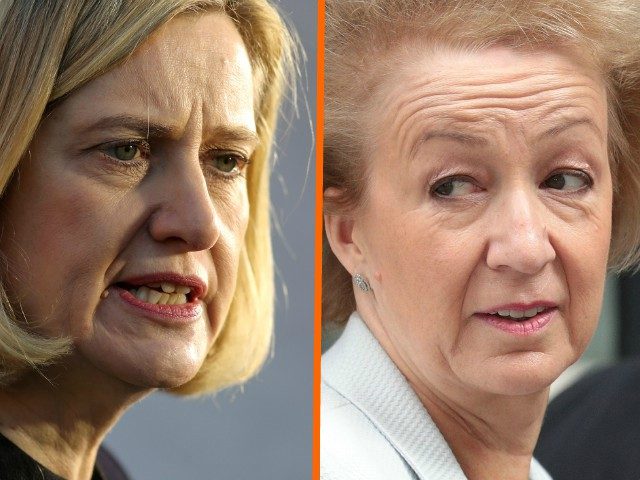Cabinet Brexiteer Andrea Leadsom has attacked suggestions by Cabinet Remainer Amber Rudd that there could be a “plausible argument” for a second referendum if the Withdrawal Agreement is voted down in Parliament.
Speaking on ITV’s Peston Wednesday night, Secretary of State for Work and Pensions Amber Rudd said: “I have said I don’t want a ‘People’s Vote’, or a referendum in general, but if Parliament absolutely failed to reach a consensus, I could see there would be a plausible argument for it.”
The suggestion is in direct opposition to Conservative Party and official Government policy, and flies in the face of Prime Minister Theresa May’s personal pledges that there will be no second referendum.
.@AmberRuddHR says that although it isn’t her first option, she can see a situation where there would be a plausible argument for a People’s Vote. #Peston pic.twitter.com/e7jQfHTDzZ
— Peston (@itvpeston) December 19, 2018
House of Commons leader and Brexiteer Andrea Leadsom told ITV’s Good Morning Britain that “we won’t have a second referendum. That is not government policy.”
Ms Leadsom added that it would be “unacceptable” to have a second referendum, and when asked by BBC Radio 4’s Today programme host Nick Robinson if Ms Rudd’s argument had basis, she replied, “No, absolutely not.”
“We had the biggest democratic exercise and the majority voted to leave the EU. It is our duty to make sure we do that,” she vowed.
“I would have to bring forward the legislation. It would take months and months, if not well over a year, simply to get the legislation through, by which time we would have left the EU.
“I don’t understand why anybody thinks it is either a good idea or a practical idea.”
'I don't really want to speculate on what happens if the PM's deal doesn't go through' – @andrealeadsom explains what a 'managed no deal' would look like.
For more, head here: https://t.co/9UgyeQmzzI pic.twitter.com/p7RnO7NU56
— Sky News Politics (@SkyNewsPolitics) December 20, 2018
Conservative Party Remainers have sought to destabilise plans for a ‘no-deal’ Brexit after Downing Street announced that Mrs May’s Cabinet would be ramping up preparations for the United Kingdom making a clean break from the European Union in earnest.
Ultra-Remain Tory MPs Anna Soubry, Nick Boles, and Sarah Wollaston — who all represent constituencies which voted Leave in the June 2016 referendum — threatened to quit the party if the Cabinet commits to a No Deal, while the Treasury, overseen by Remainer Chancellor Philip Hammond, has been accused of slowing down No Deal preparations.
Media reports that at least 11 Cabinet ministers support a “Managed No Deal” — where Britain would leave the EU as planned on March 29th without a long transition period, paying a divorce bill, or being legally bound to an Irish “backstop” which could threaten the integrity of the British Union by locking Northern Ireland in regulatory alignment with the bloc.
Instead, the British government would broker mini-deals in areas such as medicine and aviation.
Ms Leadsom was asked about the prospect of a Managed No Deal on BBC Radio 4, and explained: “‘No Deal’ implies that we leave in March and there are absolutely no agreements whatsoever. But what we already saw yesterday, in the EU’s preparations which they have very belatedly started to make for No Deal, is that there are going to be agreements on things like aviation, on things like haulage, on things like tourist travellers and so on.
“A Managed No Deal does not necessarily mean there is no withdrawal agreement at all,” she said.
Tory Ultra-Remainers to Resign from Party if Govt Pursues ‘No Deal’ Brexit https://t.co/bRKHhirPAu
— Breitbart London (@BreitbartLondon) December 19, 2018
Europhiles and the mainstream media have argued certain issues are insurmountable without an agreement that keeps the United Kingdom as closely tied to the EU as possible — “Brexit In Name Only”, or BRINO.
For example, the Irish “backstop” arrangements are allegedly needed to stop a “hard” border with customs checks between EU Ireland and British Ulster.
However, as veteran eurosceptic John Redwood notes, there is already a so-called hard border, as both countries have different currencies, VAT, corporation tax, and excise duties — yet trade moves near-seamlessly between the EU Republic of Ireland and the United Kingdom’s soon-to-be-Brexited Northern Ireland regardless.
In the event of No Deal, the United Kingdom has signed up to arrangements such as the Common Transit Convention which fast tracks transit of goods to third countries.
In addition, Britain could trigger Article 24 of the World Trade Organization’s rules, which allows for the negotiation of free trade agreements with zero tariffs for up to ten years.
REPORT: 11 Cabinet Ministers Back ‘Managed No Deal' Brexit https://t.co/9LzvfHlmwV
— Breitbart London (@BreitbartLondon) December 18, 2018

COMMENTS
Please let us know if you're having issues with commenting.